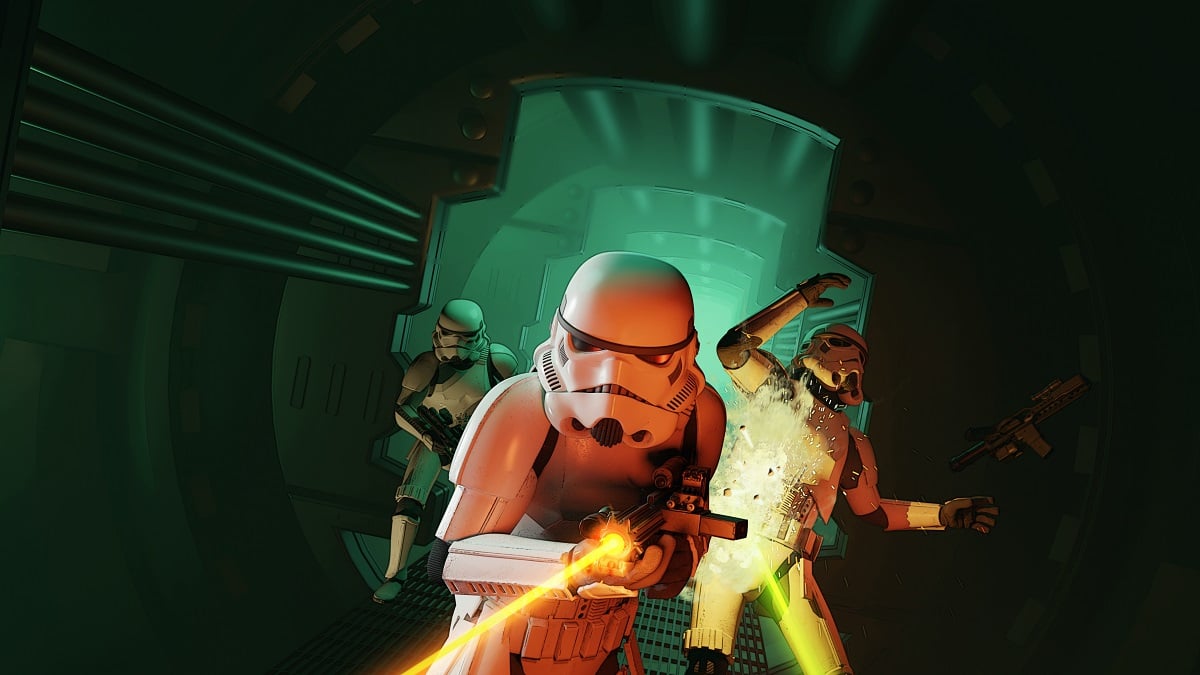
Control wasn’t what I used to be anticipating. The builders of this third-person psy-shooter have been nattering about “weird fiction” and belabouring the game’s literary inspirations. After telekinetically yeeting myself via it, nevertheless, I’ve discovered little insightful storytelling, only a trad conspiracy/thriller story, and many vibrant excuses as to how somebody can all of a sudden develop superpowers. But when it feels this satisfying to carry an workplace chair together with your mind and hoof it at a row of monster guards, I don’t care that it’s inside the videogame equal of Warehouse 13. Control can also be surprisingly humorous. Those in search of a Lynchian labyrinth of hidden which means would possibly discover it right here in the event that they squint, however what I discovered was a strong comedy pastiche of the X-Files, proper all the way down to a mysterious smoking man. I wouldn’t need it to be the rest.
You are Jesse Faden, a lady who has seemingly walked off the New York City streets, and right into a brutalist authorities constructing that no different city-dweller can see, regardless of it towering over the skyline. It’s the Federal Bureau of Control, and it’s within the midst of a lockdown. A disastrous entity (which you identify “the Hiss”) has appeared and is infecting the workers, turning them into shooty monsters with heads that explode into blurry mist whenever you bullet them up.
You obtain this with a particular gun. Alice L has already gone via a lot of the details about this Rubik’s Cube of a firearm. Basically, although, it’s a gun with many modes. It modifications form at your behest from pistol to shotgun to grenade launcher to snipey rail gun to rat-tat-tat-tat machine gun. There are upgrades, made with supplies you discover in containers, or that are dropped by enemies. You discover attachments for the gun the identical means. Some make the machine gun hearth sooner, others management the unfold of the shotty’s pellets, and so forth.
What about when the gun runs out of bullets? Well, that’s whenever you begin utilizing your superpowers. You uncover your interior telepath fairly early, and choose up new talents as you discover the shifting corridors of the Bureau’s constructing. Soon, fights tackle a sample of taking pictures on the Hissy boys till your gun runs out of ammo, then flinging bits of concrete at your foes whereas it reloads. Later, you’ll be doing fast, blinky dodges, or lifting rubble up to make use of as a protect, or just hovering in mid-air and brainwashing the closest Hisspot so he fights for you.
This rhythm of pop-pop-fling-fling feels good for many of the game, nevertheless it additionally hardly ever modifications. There is a playfulness to the combating when every new potential reveals up, however I discovered myself tiring of the identical repeated, 60-second components by the top of all of it. The game makes efforts to combine up this components by including extra baddies – shieldy shootmen, flying flingers, explodey wobblecorpses – or setting fights in rooms with gaping insta-death pits, nevertheless it hardly ever felt like an satisfactory change of tempo.
Indeed, fights in tighter quarters typically really feel cramped, and chuckable objects or small bits of geometry typically get in your means as you strafe about, resulting in a form of mid-fight stickiness. That’s an rare downside, however one which contributes to the more and more irritating nature of gun battles because the game goes on.
Control’s sense of repetitiveness is down to some small options. To refill your well being bar, for instance, it’s a must to hoover up blue droplets that fall from enemies, which makes the intuition of falling again whenever you’re harm counter-productive. You must kill a lot of Hissants, then whoosh out into the open and slurp up the well being as you combat. A variety of last-ditch zooms to get well being finish in dying and an annoying jaunt again via the extent, as a result of whenever you die, you respawn again on the final management level (checkpoints you can too quick journey between). This makes repeated deaths an train in navigating probably the most not too long ago traversed couple of corridors time and again, and typically repeating skirmishes you’ve already gained.
I point out these issues up-front, however know that many of the battles are pleasant fling-fests. Control is a really serviceable shooter. It feels good within the fingerbits, you recognize? And there are lots of wobbly visible results that make your powers really feel like easy Hollywood super-nonsense. Lift a bench off the bottom, and the paper and particles round it would float beside you too. Psychically punch a bathroom cubicle and it’ll shatter into pleasing splinters, the cistern crumbling beneath your psychological rage. One psy-brawl takes place in a mannequin city the place all of the waist-high homes are made from plywood. As the final Hisshead dies and the combat music fades away, the entire place is left as a multitude of sawdust and smashed miniature bungalows.
The game’s dud moments come occasionally, however they do come. Some non-compulsory quests finish in annoying puzzle bosses, together with one mood tantrum of a boss who creates instantaneous dying pitfalls within the floor, in a combat the place you spend more often than not aiming upwards at a giant weak level, unable to look at what’s beneath your ft. I finished bothering with facet quests after one other bothersome paranormal boss involving floaty platforming and a bunch of exploding floaty-bads. I feel I simply don’t fee the slow-moving levitate potential that extremely.
There are another small irritations. The lighting does that mega-darken factor whenever you step right into a shadowy space, mimicking the shitness of human imaginative and prescient and making it momentarily arduous to see. That’s a contemporary visible impact I’d be blissful to telepathically hurl off a concrete skyscraper. And like I say, the combating will get a bit irritating. One scene has you traipsing round a always shifting lodge, combating to rock music. But the tight quarters and lack of canopy in lots of these rooms calls for faster reflexes than many of the remainder of the game. Your thumbs and mind is likely to be faster than previous lumberfuck right here [points to own face, slowly] so your combat mileage could fluctuate. But to me it felt like an unwelcome spike in issue, just like the non-compulsory boss fights of earlier than.
Of course, I’ve spoken quite a bit in regards to the shooty-bangs and flingy-florps, however little or no in regards to the chat-o-tale. That’s partly a want to maintain spoilers from you, but in addition as a result of the story, when you scratch away the “weird” stuff, is definitely pretty rote. Scientists scienced too arduous, experiments have gone improper, the federal government is overlaying stuff up. Standard. But as talked about above, I used to be pleasantly stunned at how a lot humour is buried within the game, principally within the paraphernalia you choose up alongside the way in which. There are humorous notes with large redacted patches of textual content, and analysis movies that includes the Bureau’s head scientist, Dr Darling, surrounded by previous knobular machines and large 60s pc banks. These are sometimes price a chuckle, and have the identical corporation-comedy tone because the doctors from oddball Netflix show Maniac.
There can also be a darkly comedian and unnerving in-game TV present known as The Threshold Kids, that includes two puppets with a extra eerie presence than Bosco himself. I cherished stumbling throughout these two creepiquins on the workplace’s TV units, and their first video left me nervously air-laughing like a gasping hyena.
And there’s extra! It’s humorous when your new analysis assistant Emily begins speaking with glee about knives made from interdimensional rock (“Think of the combat applications! Stabbing! Slicing! Gouging!”) It’s humorous to learn back-and-forth memos between two Bureau brokers complaining in regards to the weird-ass assignments they must do, like cataloguing a useless canine for data, or inspecting the contents of a thousand tiny containers (there’s a human tooth in each field). Throughout the story, Jesse has a direct line of communication to an otherworldly pyramid of untold intradimensional information, a being of infinite geometry and thriller and intelligence. It tells you easy methods to craft weapons.
This sense of humour saves the game from being a shrugging, dry successor to Psi-Ops: The Mindgate Conspiracy. It’s one other reminder that self-awareness is commonly needed in case you are making one thing inherently ridiculous. The critical facet of Control’s story is generally informed via interior monologue, collectible FMV movies, and dream-flavoured cutscenes. The downside with utilizing dream logic and imprecise sequences of flashing faces, nevertheless, is that similar to a dream, it quickly turns into unrooted and meaningless. You’ll in all probability neglect Control’s story by the point you sweep your enamel the subsequent day. But you’ll bear in mind the Threshold Kids and Dr Darling.
Overall, I had fun, particularly when introducing the Hissyfit boys to massive desks at pace. But by the point I reached the top, via the game’s twists and somersaults, I used to be additionally form of glad it was completed. I’ll not be cleansing up the sidequests or indulging in further Hiss-mopping duties, as a result of it looks like I’ve seen mainly all there’s to see on this concrete workplace. Or a minimum of, sufficient to get the thought.
What I’ll reward extremely is how Control indulges its personal ludicrous nature each step of the way in which. I can’t overstate the truth that it’s a humorous game – humorous sufficient that the humour retains you going from combat to combat, looking out not for the supply of your mysterious enemy, or for the reply to all of the sub-mysteries surrounding Jesse, however for the subsequent episode of the Threshold Kids.











